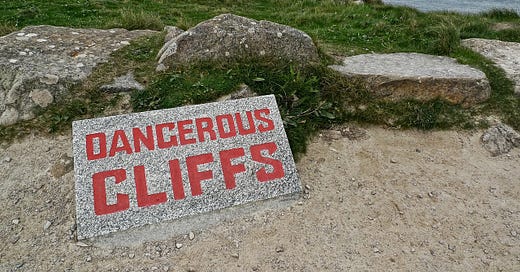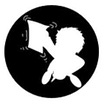The Perils of Editing Poetry
"Trying to orient oneself as an editor can be like plummeting into an inescapable maze..."
Welcome to our weekly column offering perspectives on lit mag publishing, with contributions from readers, writers and editors around the world.
Editing is a noble but thankless pursuit.
When you read a great book, everybody lauds the author. They’re such an amazing talent. If you read a bad book, often the criticism is that it’s been “poorly edited.” The hapless editor is a selfless workhorse flogged mercilessly, unsatisfactorily rewarded, and rarely praised publicly.
I’d know. I was an editor for ten years. Such is our plight.
One of the more perilous forms of editing I undertook was editing poetry – a specialization that requires the patience, delicacy, and understanding usually associated with talking a jumper from a ledge. It’s not just poetry’s meter, rhyme, and figures of speech that make editing it difficult, but learning to navigate the poet also.
Poets create worlds that are replete with their own laws, physics, and ideologies. Trying to orient oneself as an editor can be like plummeting into an inescapable maze where paranoia lurks at every corner, and danger awaits at the end of every strait.
For this reason, many poets are unjustifiably distrustful of editors, fearing that the virtuous editor simply won’t understand what they’re writing. Therefore, the editor cannot begin work – nor should the editor begin work – until they have become intimate with the poet’s world.
How is this accomplished? you may ask.
In August of last year, a group of editors and a group of poets met at the prestigious Northwest Writer’s Festival to reconcile a methodology for editing poetry that would allow editors to feel they were doing their job without betraying the poet’s intent, and which would encourage the poet to feel confident they could trust their editor.
Let me set the scene: the local library, and Leonardo Bellows – author of the best-selling memoir Bellows Mellows (Strident Publishing 2013), the audiobook Bellows bellows (Magnifique Publishing 2016), and his verse memoir detailing his bout with cirrhosis, Bellows Yellows (Jaundice Publishing 2018), as well as a poetry teacher at various institutions (schools, that is, not asylums), and as resplendently megalomaniacal as any James Bond villain, led a brood of poets (“brood” the collective noun for a group of poets).
Amongst them were the famed poet Boris Ischenko, winner of the Self-Flagellant of the Year 2018, the Best Stanza in Poetry Award 2016, and The Heart Harps 2015; former criminal Adam Stromberg, who turned his life around through his writing, and was named Poet Emeterio 2009, 2010, and 2011, and Folsom Prison Poet of the Year 2012; and Sue Kennell, winner of the Octogenarian Poet of the Year 2013, Most Promising Newcomer 2015, and who’s published several poetry anthologies.
For us selfless editors, it had already been a long day, what, with our morning charity work, helping the poor, the unfortunate, and the homeless – many of whom, incidentally, are amongst this nation’s most successful poets.
We editors entered the meeting in all humility, but the poets, frankly (and unfairly), expected the worst. Certainly, there had been mean-spirited stories circulating beforehand in the foyer – murmurings that the editors were out to persecute them; to sabotage them; to mutilate them; dismember them, their work, their lives, their hopes, their dreams, and their industry. It was almost as if the poets took what we editors had bandied around the water cooler as gospel.
Here’s an unwavering truth, though: as professional editors paid to be objective, as well as people who have a love of the publishing industry and seek only the enrichment of our literary community, we assured the poets we treated their work with the utmost respect and care.
But – and I did present this to the room with emphasis – when it came to the esteemed publications we represented, ranging from the journals whose reputations rely on our professionalism to publishers championing poetry, there had to be no bias. Because whether it’s the submissions we solicit from friends and accept, or the slush from people who we don’t know and which we reject, we strive to offer Titanic infallibility.
Were the poets satisfied, though?
Nope.
For the next hour, they mercilessly assailed us with their concerns; concerns for which they obviously sought understanding, empathy, and assurance; concerns emblematic not just of this brood, but the poetry community as a whole; concerns that I might’ve taken that very opportunity to address had I, in fact, not been focusing my attention on feeding my Tamagotchi.
It did seem that the poets felt we editors held no respect for their craft. We countered that what the poets had to appreciate was that we understood their plight given that many of us editors are writers just like them. Well, not just like them. We’re generally a cheerier lot. Still, we’re writers all the same. Many of us are aspiring screenwriters, novelists, and journalists. There’s even a rhymer or two amongst our ranks. Of course, that begs a question which is universal to the publishing world, and which was articulated by the poets at this very meeting: why then do we become editors?
And here is the truth: it’s just that after years and years of writing; years and years of disappointment after disappointment; rejection after rejection after rejection; writing hopes and dreams burning, fading and disappearing until all that’s left is the thought of swallowing a bottle of sleeping tablets, lounging in the tub, slashing our wrists, and lifting a gun to our temple, we realize there is but one recourse in this writing life left to us.
Editing.
This is an indisputable juncture that all aspiring writers will inevitably reach.
For now, though, we assured the poets we weren’t out to harm them, or sabotage them, and certainly we wouldn’t take those courses of action out of bitterness, resentment, malice, anger, or pettiness or even poetic license. We emphatically asserted that our hope is just that every poem, when it’s not lost in a filing mishap, unwittingly deleted by one of our clueless interns, or glossed over by an exhausted reader, realizes its fullest potential.
As proof of our dedication, I showcased some poetry that I edited as an exercise just for the Festival. Because I knew the poets present might get defensive if I’d used any of their work as an example, I went on the net, Googled “poetry,” and randomly selected a verse by some guy named Keats – probably some privileged pimply-faced private school brat trying to impress a would-be suitor or something.
Anyway, here’s the original verse:
When by my solitary hearth I sit, And hateful thoughts enwrap my soul in gloom; When no fair dreams before my "mind's eye" flit, And the bare heath of life presents no bloom; Sweet Hope, ethereal balm upon me shed, And wave thy silver pinions o'er my head!
Well, what can you say?
Shocking. Melodramatic. Overwritten.
You can always tell an inexperienced writer pumped full of pretentiousness, their ambition exceeding their talent. Sometimes, they need to be saved from themselves.
Now this is after I’d edited it:
When by my electric fireplace I sit, And shitty thoughts wrap my soul in sadness, When no cool dreams in my mind’s eye zip-zip-zip! And the cupboard of life presents no gladness, Divine light, like a Snoopy nightlight, upon me shed, And bask your mushiness on my head!
The response?
The poets at the Festival sat mute (no doubt in stunned admiration), whereas the editors clapped me on the back and congratulated me thunderously. And who could blame either party for their reaction – the editors for their appreciation, the poets for their awe?
The poem now seethes with energy.
Consider, for example, the underlying theme of electricity representing the soul, how warmth and brightness embody the fullness of life, the blossoming of dreams; the stark contrast between misery (e.g. shitty thoughts, sadness) and joy (e.g. gladness – truly, no other word could epitomize what’s trying to be said as precisely); the brilliant use of italics and bold to visually demonstrate the evolution of zippiness; the connection to the everyday; and, finally, the association of familiar images for security (e.g. Snoopy) amalgamated with divinity (to represent how humanity aspires to touch God) to produce a message we can all relate to.
I was pleased with myself considering what little I had to work with. In all modesty, it really is an exemplar of how such raw but overwhelmingly shapeless material can be reforged into its truest and most irresistible form.
But that’s what we editors do: we take the dull, the unremarkable, the ordinary, hone it into the extraordinary, and then evolve and polish the extraordinary into … well, whatever’s more extraordinary – surplusordinary, maybe. There’s a word for our lexicon! I think there’s a poetry in that itself.
The real beauty of our endeavors is that we ask nothing in return, instead preferring to work assiduously, lovingly, and anonymously on getting the very best out of peotry.





Maybe this essay needed editing? Because for most of it I couldn't tell whether or not it was intended as humor.
Laughed a bunch! I enjoyed the slow open and then its kind of exponential leaps into and then past satire, with good ol’ farce getting a showing (seems rare).
The line I may take away for safekeeping is “our friends whom we solicit and accept, and the strangers who submit and we reject”. (Paraphrased; will have to look up when out of this comment block again.)